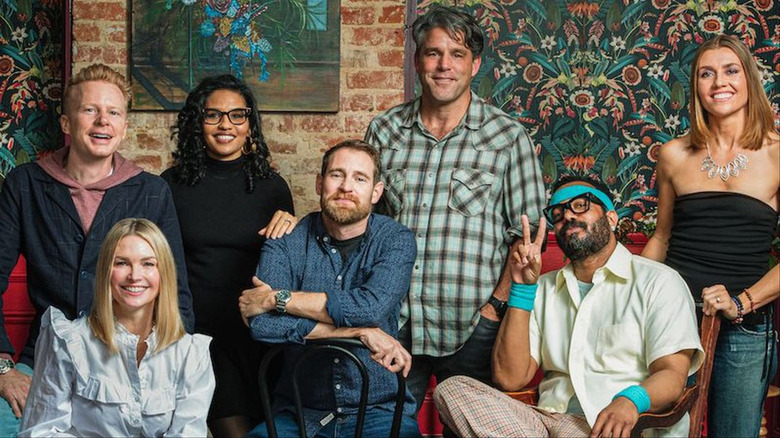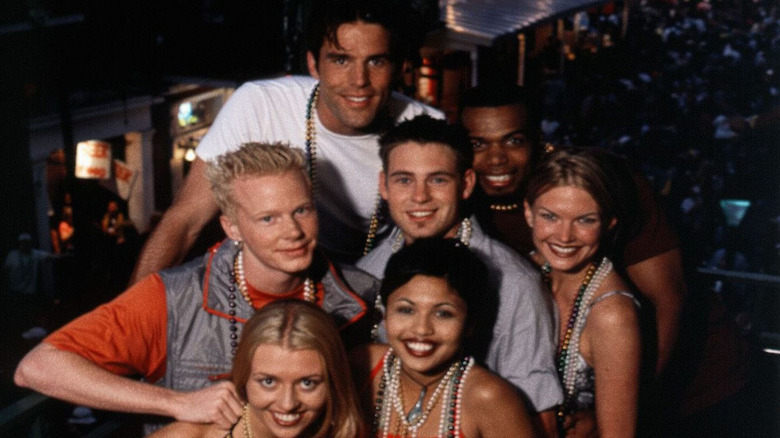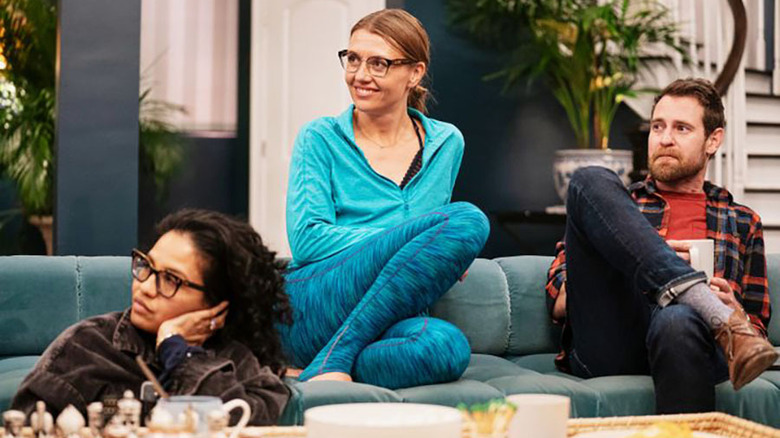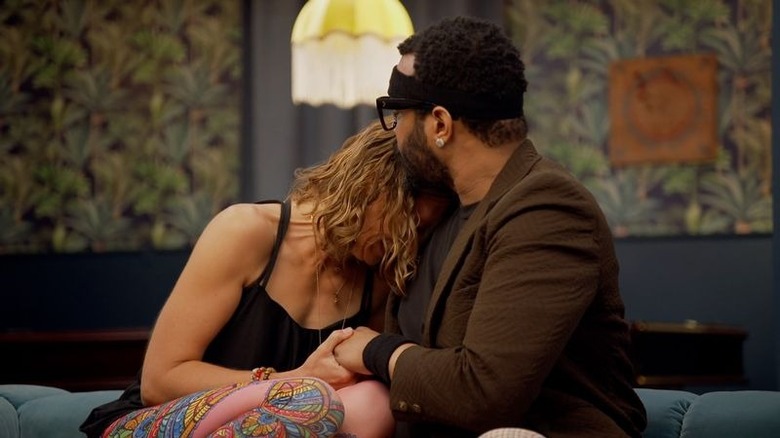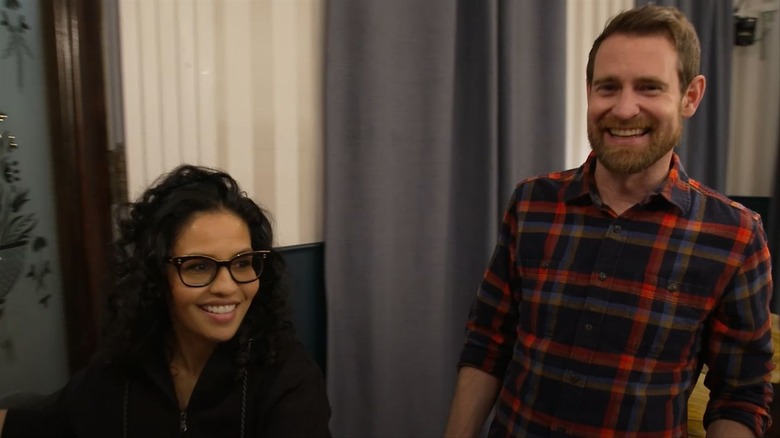The Daily Stream: Real World Homecoming: New Orleans Reflects How The Aughts Broke Us All
(Welcome to The Daily Stream, an ongoing series in which the /Film team shares what they've been watching, why it's worth checking out, and where you can stream it.)
The Series: "The Real World Homecoming: New Orleans"
Where You Can Stream It: Paramount+
The Pitch: "This is the true story of seven strangers picked to live in a house, work together, and have their lives taped, to find out what happens when people stop being polite and start getting real. Debuting in 1992, MTV's "The Real World" broke the mold in reality television, serving as both a source of soap opera levels of drama and a social experiment. In its ninth season, "The Real World" traveled to New Orleans and introduced the world to Melissa, Kelley, Jamie, Danny, Matt, Julie, and Tokyo (FKA David), who became one of the most memorable casts in history. Now, over twenty years later, the cast returns to New Orleans to reunite for two weeks. No longer twentysomethings with their eyes set on the future, the fortysomethings are forced to reflect on their actions throughout the 2000s, and show how much they've grown (or haven't), since they left their reality TV days behind.
Why it's essential viewing
It's hard to explain to the younger generations just how pivotal "The Real World" was for Gen X and Millennials, growing up in the weird flux between ordinary anonymity and the constant state of online surveillance we are all unfortunately forced to treat as normal today. In the year 2000, "The Real World: New Orleans" delivered one of the most memorable casts in the series' 33 season history, namely because of the stark differences in beliefs among the cast. Unlike seasons that were infamous sensationalist drama centered around partying and sex (This is a callout, "Las Vegas"), the cast of "New Orleans" fought for reasons like Matt's straight-edge, religious, hip-hop vibe acting in opposition of his housemates, or Julie's Mormon beliefs inspiring her bigoted attitude toward her openly gay roommate Danny. Revisiting the original season is jarring, because the very white Julie openly refers to Black people as "colored" and even drops the n-bomb when asking why it's "okay if you [referring to Tokyo] says it, but I can't?" Yikes on bikes, my dudes.
A lot has changed in the 20+ years since "The Real World: New Orleans" and watching these fully realized adults deal with their past behaviors and sensibilities is equal parts sobering and frustrating. Melissa has had to unpack what it meant to be the only woman of color on the season, Kelley has gone on to marry actor Scott Wolf ("Party of Five," "Everwood," "Go"), Matt now has a lot of children, Tokyo has changed his name, fallen into art, and become the voice of reason, Jamie has dedicated his life to extreme sports, Julie has turned into a mega-"Karen" dripping in white privilege, and Danny has had to recover from the blessing and curse of being one of the only openly gay people on television at the time.
The show is a peek at our future
There have been a multitude of culture reckonings in the last five years, where society is finally coming to grips with how marginalized people have been systemically harmed, how pop culture and media organizations have been complicit (and profitable) in perpetuating that harm, how bigoted belief systems are not a "matter of opinion," and why there's a need for people to evaluate their past behaviors. The year 2000 was before Twitter, Facebook, Instagram, and even MySpace started documenting our every move, and anyone who enjoyed their idiot teen and twentysomething years in anonymity is privileged to not have their past off-the-cuff comments or opinions out there for the entire world to scrutinize. Each year we inch closer and closer to that no longer being a luxury, as public figures are continually called out for beliefs they held when they were still under the influence of whatever nonsense their parents filled their heads with, just learning about the ways of the world when they finally took a step out of their hometowns, or comments made when the world was operating under entirely different levels of "social acceptability."
This is not to excuse anyone's awful comments or behavior, instead explaining that society is going to get really weird pretty soon. People who are currently old enough to run for President of the United States would have been 16 when MySpace debuted in 2003. With only two episodes available of "The Real World Homecoming: New Orleans" it's evident that this show is giving us a sneak peek into what is about to become our reality. And as we've seen with how Melissa, Danny, and Tokyo have been holding Julie accountable for her past actions and refusing to tolerate her clear unwillingness to genuinely repair the harm she's caused, remaining civil for the sake of civility isn't going to cut it anymore.
Don't be a Julie
What made "The Real World" so compelling was that it forced people from so many different walks of life into the same home and let us watch as they tried to find a way to coexist. Danny and Melissa endured the most of Julie's ire twenty years ago, with both acknowledging that they no longer just "brush it off" the way they once did. They're tired, the world has changed, and if someone like Julie doesn't want to get on board, she can stay left behind. What's fascinating is that Julie's return had the potential for a beautiful redemption arc, as someone entering the reunion from a place of having done and said some pretty awful stuff that has gone unaddressed for two decades. However, as Danny correctly points out, Julie doesn't want to put in the work to repair harm, rebuild trust, and make amends — she just wants it to all go away so they can go out to drag bars and get belligerently drunk like they did in their younger years.
Even after Tokyo offers her the space and language to make things better, she still finds a way to martyr herself in lieu of taking any real responsibility. Julie has become an absolute villain on the show, and it's not because she's a former Mormon with repressive beliefs, it's because she's a privileged a**hole who gets defensive and cries whenever she's asked for accountability. And that's the exact conceit of our own "culture wars" playing out all around us. You're not a bad person for having a difference in opinion, you're a bad person if you use that opinion to harm other people and refuse to own up to the harm you've caused.
Everything is different and yet exactly the same
To end things on a positive note, getting to (parasocially) reunite with Danny after all these years has brought me to tears on more than one occasion. Danny was the first openly gay non-celebrity I ever saw on TV as a kid, and seeing the blurred face of his boyfriend Paul, who was serving in the military under "Don't Ask, Don't Tell," is etched into my brain. MTV agreed to hide Paul's identity, knowing that he would lose all of the benefits of his military career if it was made known that he was gay. Watching Danny revisit footage from those scenes is absolutely heartbreaking, and he's admitted that seeing it triggers his C-PTSD. Getting to see Danny thriving after all these years is astounding, because despite the progresses that have been made since 2000, the world is still an incredibly hostile place for queer people.
If there's a MVP of the season, however, the title belongs to Melissa. She's been the realest since day one, and watching her effortlessly call out people's bulls*** is an art. "Sometimes I think about Julie and I think of the word 'outta,' actually," she says. "Because she be outta boundaries, she be outta pocket, she be outta her mind. This was one of those nights." Every episode is a masterclass of Melissa showing the world how to set boundaries, call people to the carpet when they're wilding out, and still manage to find the joy in a broken world. "The Real World: New Orleans" is the show I needed as a pre-teen trying to make sense of the world, and "The Real World Homecoming: New Orleans" is the show we all need as adults figuring out how to survive it.
